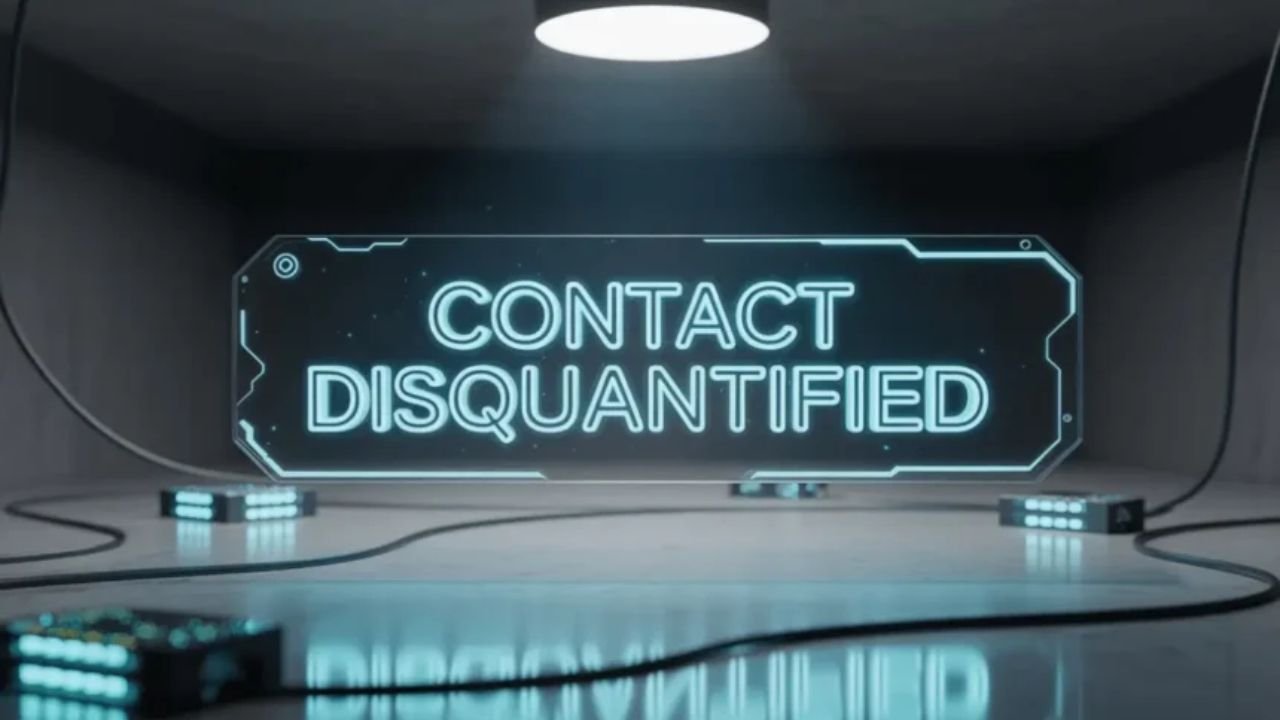The word “disquantified” isn’t one you hear much. Strange, right? It feels heavy, like a label that pushes someone out of the count. Picture it. An athlete losing a match and not just the game, but their place. A worker, résumé tossed aside, never even called back. A voice in the crowd that speaks, but nobody listens. These are the disquantified. And here’s the thing reaching out matters. Because sometimes being unseen, being ignored, hurts more than losing itself.
Contacting them means showing care, finding hidden value, and giving space to stories we often miss. In the following content, we will explore what this word means, why it matters, and how connecting with the disquantified can change both their life and ours.
What Does “Disquantified” Mean?
The word disquantified is not common, but it carries deep meaning. At first, it may sound close to disqualified, which means excluded or rejected from a competition or process. But disquantified goes beyond that. It means being stripped of measure, placed outside the system, or not counted at all. In other words, it is about people who don’t fit the usual rules, labels, or numbers.
In society, education, or work, the disquantified are those who get overlooked. They are not measured by standard success or recognition. It could be a student who learns differently, a worker who doesn’t match the job description, or a community whose voice is rarely heard.
Why Contact the Disquantified?

Contacting the disquantified means reaching out to those left on the margins. It matters because ignoring them only deepens their silence. Giving them a voice shows that they still have value. Recognizing people beyond titles, grades, or job status creates a culture of empathy.
When we contact the disquantified, we say: “You matter even if the system does not see you.” This builds human connection and reminds us that worth is not always measured by success.
Examples in Real Life
Sports
An athlete may be disqualified from a game, but their story and struggle still inspire others. Their lessons about discipline, failure, and resilience can be more powerful than victory itself.
Work and Jobs
Job candidates who are rejected are often highly skilled. Many go on to build new careers or start businesses. By ignoring them, we lose talent. By reaching out, we might discover hidden potential.
Society
Marginalized groups whether due to race, class, disability, or other reasons often live as the disquantified. They may be unheard in public spaces. Contacting them means listening and making room for their voices.
Key Benefits of Reaching Out
- Inclusion and Diversity: It builds a culture where everyone feels seen and valued.
- Hidden Opportunities: Many disquantified people carry skills, wisdom, or creativity that can surprise us.
- Stronger Community: Reaching out builds bridges, reduces isolation, and strengthens human ties.
Risks and Challenges
- Miscommunication: Sometimes reaching out can be misunderstood. Intentions must be clear.
- Personal Choice: Not everyone wants contact after exclusion. Some need space to heal.
- Respect and Privacy: Helping should not cross into invading someone’s boundaries. Balance is key.
How to Contact the Disquantified (Practical Tips)
- Listen More: Instead of giving advice, let them share their story.
- Offer Empathy, Not Judgment: Avoid labels or assumptions.
- Create Safe Spaces: A calm, respectful environment helps trust grow.
- Be Sincere and Patient: Change takes time. Real support is steady, not rushed.
Alternatives to Silence
Silence often deepens exclusion. Instead, we can use platforms, communities, and groups to give space to unheard voices. Supporting is not only about words. Actions such as offering opportunities, sharing resources, or standing beside them matter more.
Broader Meaning of “Disquantified” in Modern Times
In today’s world, we are often measured by numbers grades, salaries, followers, likes, or performance reviews. The disquantified remind us that value is bigger than numbers. They stand outside the system, and in doing so, they question it.
To contact the disquantified is to look past metrics and see the human being. It is a call to value people not for what they “achieve” but for who they are.
Contact the Disquantified is a conceptual topic, we can’t pull exact statistics for the word itself, but we can use facts and figures from related areas (exclusion, rejection, marginalized groups, overlooked talent). Here’s a facts and figures table you can include in your article:
Facts and Figures Related to the Disquantified
| Area of Life | Fact / Figure | Source / Context |
|---|---|---|
| Work & Jobs | About 72% of job applications are never seen by a human recruiter due to automated filters. | Hiring studies (ATS systems) |
| Education | Around 1 in 5 students in the U.S. has learning differences, but many feel unsupported in school. | National Center for Learning Disabilities |
| Society | 15% of the world’s population lives with some form of disability, yet they are often excluded from opportunities. | World Health Organization |
| Sports | In the 2021 Olympics, dozens of athletes were disqualified, but many later became motivational speakers. | Sports news reports |
| Employment Gaps | About 27% of workers with disabilities face unemployment, almost double the rate of those without disabilities. | U.S. Bureau of Labor Statistics |
| Social Media | Over 60% of people say they feel “invisible” or “overlooked” online compared to influencers with large followings. | Digital culture surveys |
Conclusion
In the end, “contact the disquantified” feels more like a gentle reminder than a rule. It’s about the people who get left out, the ones nobody counts anymore. An athlete disqualified from a match. A worker turned down for a job. A whole community ignored by the system.
Their worth doesn’t vanish just because the scoreboard or the system says so. When we reach out, things change. We see more inclusion, we feel more empathy, and sometimes hidden skills come to light. Sure, there are risks. Misunderstandings happen. Not everyone wants to be found. But if we move with care, if we listen more than we talk, the good outweighs the bad.
The truth is simple. When we only measure people by numbers, by status, by what they can produce, we lose the human part. But when we choose to contact the disquantified, we open doors for stories, for voices, that might change their life and maybe even ours too.


No responses yet